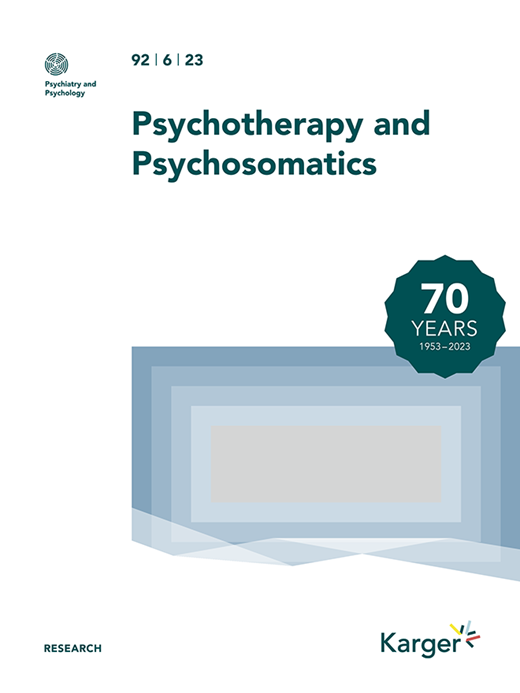A Tale of Two Treatments: A Randomised Controlled Trial of Mindfulness or Cognitive Behaviour Therapy Delivered Online for People with Rheumatoid Arthritis.
IF 17.4
1区 医学
Q1 PSYCHIATRY
引用次数: 0
Abstract
INTRODUCTION This study aimed to determine the relative efficacy of mindfulness-based stress reduction (MBSR) or cognitive behaviour therapy (CBT) in comparison to a waitlist control (WLC) for people with rheumatoid arthritis (RA). Participants completed assessments before and after treatment and at 6-month follow-up. METHODS Two hundred and sixty-nine participants with RA were recruited and randomised in a 2:2:1 ratio to MBSR:CBT:WLC. Participants completed a semi-structured clinical interview for depression and were stratified for history of recurrent depression. We measured the primary outcome of pain interference, as well as pain severity, depression, anxiety, functional ability, and fear of progression. We predicted that MBSR and CBT would result in improvements compared to WLC. We also predicted that those with a history of recurrent depression would benefit more from MBSR than CBT for depression. RESULTS MBSR and CBT were equally efficacious in reducing pain interference compared to WLC. Similar results were found for depression. MBSR demonstrated superior outcomes to CBT for fear of progression at post-treatment and functional ability at 6-month follow-up. CBT only was better than WLC for pain severity at 6-month follow-up. Depressive status did not moderate the efficacy of treatment. CONCLUSIONS MBSR and CBT resulted in statistically and clinically significant changes in pain interference compared to WLC. MBSR was more efficacious than CBT for functional ability and fear of progression, while CBT showed superiority for pain severity. The effect sizes were comparable to those achieved with face-to-face interventions, confirming both online treatments are effective for people with RA.两种治疗的故事:一项针对类风湿关节炎患者的正念或认知行为疗法的随机对照试验。
本研究旨在确定正念减压(MBSR)或认知行为疗法(CBT)与等候名单对照(WLC)对类风湿关节炎(RA)患者的相对疗效。参与者在治疗前后和6个月的随访中完成了评估。方法招募269名RA患者,按2:2:1的比例随机分配至MBSR:CBT:WLC。参与者完成了抑郁症的半结构化临床访谈,并根据复发性抑郁症的历史进行分层。我们测量了疼痛干扰的主要结局,以及疼痛严重程度、抑郁、焦虑、功能能力和对进展的恐惧。我们预测正念减压和认知行为疗法会比认知行为疗法带来改善。我们还预测,那些有复发性抑郁症病史的人从正念减压疗法中获益比CBT治疗抑郁症更多。结果与WLC相比,smbsr和CBT在减轻疼痛干扰方面同样有效。抑郁症也有类似的结果。在治疗后恐惧进展和6个月随访时的功能能力方面,正念减压疗法表现出优于CBT的结果。在6个月的随访中,CBT在疼痛严重程度上优于WLC。抑郁状态不影响治疗效果。结论与WLC相比,smbsr和CBT对疼痛干扰的影响具有统计学意义和临床意义。正念减压在功能能力和对进展的恐惧方面比CBT更有效,而CBT在疼痛严重程度方面表现出优势。效果大小与面对面干预的效果相当,证实两种在线治疗对类风湿关节炎患者都有效。
本文章由计算机程序翻译,如有差异,请以英文原文为准。
求助全文
约1分钟内获得全文
求助全文
来源期刊

Psychotherapy and Psychosomatics
医学-精神病学
CiteScore
29.40
自引率
6.10%
发文量
46
期刊介绍:
Psychotherapy and Psychosomatics is a reputable journal that has been published since 1953. Over the years, it has gained recognition for its independence, originality, and methodological rigor. The journal has been at the forefront of research in psychosomatic medicine, psychotherapy research, and psychopharmacology, and has contributed to the development of new lines of research in these areas. It is now ranked among the world's most cited journals in the field.
As the official journal of the International College of Psychosomatic Medicine and the World Federation for Psychotherapy, Psychotherapy and Psychosomatics serves as a platform for discussing current and controversial issues and showcasing innovations in assessment and treatment. It offers a unique forum for cutting-edge thinking at the intersection of medical and behavioral sciences, catering to both practicing clinicians and researchers.
The journal is indexed in various databases and platforms such as PubMed, MEDLINE, Web of Science, Science Citation Index, Social Sciences Citation Index, Science Citation Index Expanded, BIOSIS Previews, Google Scholar, Academic Search, and Health Research Premium Collection, among others.
 求助内容:
求助内容: 应助结果提醒方式:
应助结果提醒方式:


